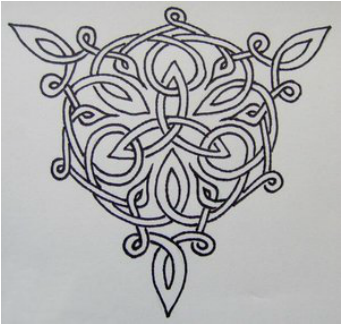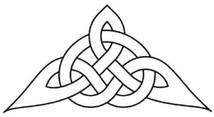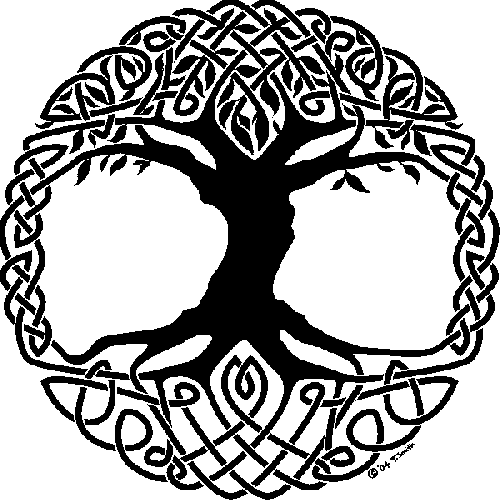Read, memorize, write and recite good poetry!
|

The Song of Amergin from the Book of Leinster
(http://celticmythpodshow.com/Resources/Amergin.php) Earliest manuscript: Lebar na Núachongbála (The Book of Leinster) p. 49 in the diplomatic edition; from the CELT site Ic tabairt a choisse dessi i nHerind asbert Amairgen Glúngel mac Miled in laídseo sís. 1. Am gáeth i mmuir. ar domni. 2. Am tond trethan i tír. 1550] {MS folio 12b 40} 3. Am fúaim mara. 4. Am dam secht ndírend. 5. Am séig i n-aill. 6. Am dér gréne.g 7. Am caín. 1555] 8. Am torc ar gail. 9. Am hé i llind. 10. Am loch i mmaig 11. Am briandai. 12. Am bri danae. 1560] 13. Am gai i fodb. feras feochtu. 14. Am dé delbas do chind codnu. 15. Coiche nod gleith clochur slébe. 16. Cia on cotagair aesa éscai 17. Cia dú i llaig funiud grene. 18. Cia beir búar o thig Temrach. 19. Cia buar Tethrach. tibi. 20. Cia dain. 21. Cia dé delbas faebru. a ndind ailsiu. 22. Cáinté im gaí cainte gaithe. Am. James Carey's translation: from The Celtic Heroic Age (2003) (pg. 265) 108. As he set his right foot upon Ireland, Amairgen Glúngel son of Míl recited this poem: I am a wind in the sea (for depth) I am a sea-wave upon the land (for heaviness) I am the sound of the sea (for fearsomeness) I am a stag of seven combats (for strength) I am a hawk upon a cliff (for agility) I am a tear-drop of the sun (for purity) I am fair (i.e. there is no plant fairer than I) I am a boar for valour (for harshness) I am a salmon in a pool (for swiftness) I am a lake in a plain (for size) I am the excellence of arts (for beauty) I am a spear that wages battle with plunder. I am a god who froms subjects for a ruler Who explains the stones of the mountains? Who invokes the ages of the moon? Where lies the setting of the sun? Who bears cattle from the house of Tethra? Who are the cattle of Tethra who laugh? What man, what god forms weapons? Indeed, then; I invoked a satirist... a satirist of wind. William Butler Yeats THE SECOND COMING Turning and turning in the widening gyre The falcon cannot hear the falconer; Things fall apart; the centre cannot hold; Mere anarchy is loosed upon the world, The blood-dimmed tide is loosed, and everywhere The ceremony of innocence is drowned; The best lack all conviction, while the worst Are full of passionate intensity. Surely some revelation is at hand; Surely the Second Coming is at hand. The Second Coming! Hardly are those words out When a vast image out of Spiritus Mundi Troubles my sight: a waste of desert sand; A shape with lion body and the head of a man, A gaze blank and pitiless as the sun, Is moving its slow thighs, while all about it Wind shadows of the indignant desert birds. The darkness drops again but now I know That twenty centuries of stony sleep Were vexed to nightmare by a rocking cradle, And what rough beast, its hour come round at last, Slouches towards Bethlehem to be born? Sunday Morning BY WALLACE STEVENS I Complacencies of the peignoir, and late Coffee and oranges in a sunny chair, And the green freedom of a cockatoo Upon a rug mingle to dissipate The holy hush of ancient sacrifice. She dreams a little, and she feels the dark Encroachment of that old catastrophe, As a calm darkens among water-lights. The pungent oranges and bright, green wings Seem things in some procession of the dead, Winding across wide water, without sound. The day is like wide water, without sound, Stilled for the passing of her dreaming feet Over the seas, to silent Palestine, Dominion of the blood and sepulchre. II Why should she give her bounty to the dead? What is divinity if it can come Only in silent shadows and in dreams? Shall she not find in comforts of the sun, In pungent fruit and bright, green wings, or else In any balm or beauty of the earth, Things to be cherished like the thought of heaven? Divinity must live within herself: Passions of rain, or moods in falling snow; Grievings in loneliness, or unsubdued Elations when the forest blooms; gusty Emotions on wet roads on autumn nights; All pleasures and all pains, remembering The bough of summer and the winter branch. These are the measures destined for her soul. III Jove in the clouds had his inhuman birth. No mother suckled him, no sweet land gave Large-mannered motions to his mythy mind. He moved among us, as a muttering king, Magnificent, would move among his hinds, Until our blood, commingling, virginal, With heaven, brought such requital to desire The very hinds discerned it, in a star. Shall our blood fail? Or shall it come to be The blood of paradise? And shall the earth Seem all of paradise that we shall know? The sky will be much friendlier then than now, A part of labor and a part of pain, And next in glory to enduring love, Not this dividing and indifferent blue. IV She says, “I am content when wakened birds, Before they fly, test the reality Of misty fields, by their sweet questionings; But when the birds are gone, and their warm fields Return no more, where, then, is paradise?” There is not any haunt of prophecy, Nor any old chimera of the grave, Neither the golden underground, nor isle Melodious, where spirits gat them home, Nor visionary south, nor cloudy palm Remote on heaven’s hill, that has endured As April’s green endures; or will endure Like her remembrance of awakened birds, Or her desire for June and evening, tipped By the consummation of the swallow’s wings. V She says, “But in contentment I still feel The need of some imperishable bliss.” Death is the mother of beauty; hence from her, Alone, shall come fulfilment to our dreams And our desires. Although she strews the leaves Of sure obliteration on our paths, The path sick sorrow took, the many paths Where triumph rang its brassy phrase, or love Whispered a little out of tenderness, She makes the willow shiver in the sun For maidens who were wont to sit and gaze Upon the grass, relinquished to their feet. She causes boys to pile new plums and pears On disregarded plate. The maidens taste And stray impassioned in the littering leaves. VI Is there no change of death in paradise? Does ripe fruit never fall? Or do the boughs Hang always heavy in that perfect sky, Unchanging, yet so like our perishing earth, With rivers like our own that seek for seas They never find, the same receding shores That never touch with inarticulate pang? Why set the pear upon those river banks Or spice the shores with odors of the plum? Alas, that they should wear our colors there, The silken weavings of our afternoons, And pick the strings of our insipid lutes! Death is the mother of beauty, mystical, Within whose burning bosom we devise Our earthly mothers waiting, sleeplessly. VII Supple and turbulent, a ring of men Shall chant in orgy on a summer morn Their boisterous devotion to the sun, Not as a god, but as a god might be, Naked among them, like a savage source. Their chant shall be a chant of paradise, Out of their blood, returning to the sky; And in their chant shall enter, voice by voice, The windy lake wherein their lord delights, The trees, like serafin, and echoing hills, That choir among themselves long afterward. They shall know well the heavenly fellowship Of men that perish and of summer morn. And whence they came and whither they shall go The dew upon their feet shall manifest. VIII She hears, upon that water without sound, A voice that cries, “The tomb in Palestine Is not the porch of spirits lingering. It is the grave of Jesus, where he lay.” We live in an old chaos of the sun, Or old dependency of day and night, Or island solitude, unsponsored, free, Of that wide water, inescapable. Deer walk upon our mountains, and the quail Whistle about us their spontaneous cries; Sweet berries ripen in the wilderness; And, in the isolation of the sky, At evening, casual flocks of pigeons make Ambiguous undulations as they sink, Downward to darkness, on extended wings. |



